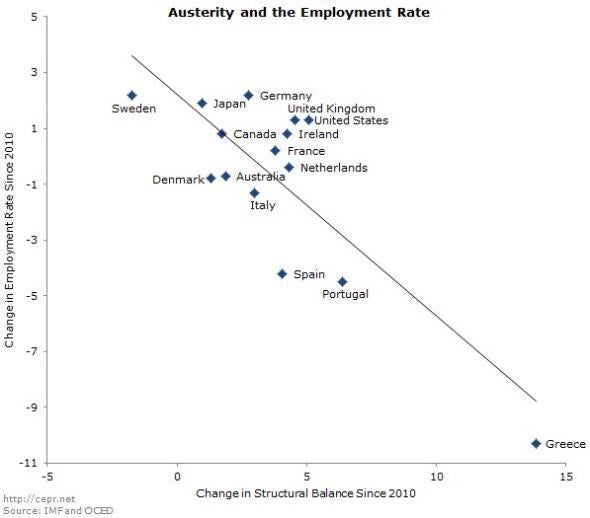At this point, it almost feels like overkill to pile on austerity advocates. I mean, we’re in 2014, six years after the Great Recession really got revved up, and tight-fisted Europe is still suffering from a raging unemployment problem. I thankfully haven’t read any stories about Greek families burning their furniture for heat lately. But the fact that central bankers are desperately trying to ward off deflation and give the eurozone’s economy a kick with negative interest rates should tell you how things have turned out after the world’s great experiment in belt-tightening.
Still, I wanted to share this chart from Ben Wolcott at the Center for Economic and Policy Research. Consider it an elegant tombstone for the austerity adventures of the past few years. The bottom axis measures how much each government cut spending and raised taxes after 2010. The left axis measures how the employment rate changed.

As Wolcott puts it: “This image very crisply suggests what Keynesians have been arguing in more nuanced ways for four years, namely that many countries cut fiscal spending too soon, prolonging the negative impacts of the Great Recession for workers.” It’s not a perfect trend—Britain retrenched about as much as Spain and hasn’t suffered nearly so terribly. But nobody is suggesting fiscal policy is the only factor at play. And the pattern is clear enough.
But wait, what if all austerity isn’t the same? As it happens, the Heritage Foundation has released a new report that’s a sort of last stand for fiscal masochism. And even it can’t muster much. Here’s a telling quote from the intro:
While not all fiscal adjustments lead to economic expansion, spending-based adjustments are less recessionary than those achieved through tax increases. When successful spending-based adjustments were not expansionary, they were associated with mild and short-lived recessions, while tax increases failed to reduce the debt and were associated with large recessions.
In other words, tax hikes are a terrible idea. Spending cuts are sometimes a good idea. But sometimes they lead to recessions. Heritage got a dream team of devoted austerians together, and this is the absolute best they could come up with.
It would be funny if so many people weren’t suffering thanks to their ideas.
